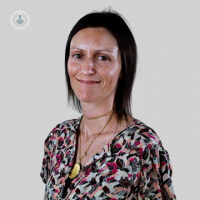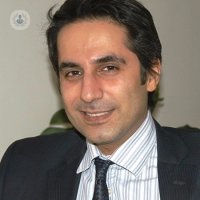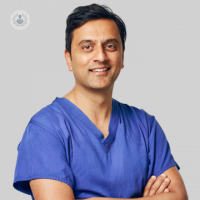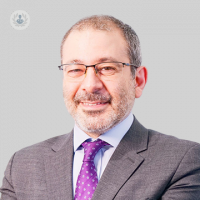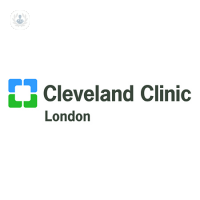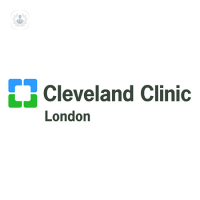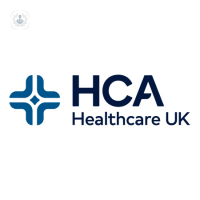What is achalasia?
Achalasia is a rare disorder that effects the oesophagus (food pipe), making it very difficult to swallow food and drink and for it to pass into the stomach. This happens when the ring of muscle at the end of the oesophagus does not open fully, if at all. As a result, food and drink cannot be squeezed down into the stomach and gets stuck, and is often regurgitated.

What are the symptoms of achalasia?
Not everyone with this disorder has symptoms, but those who do can experience:
- Regurgitating undigested food
- Chest pains
- Coughing fits
- Heartburn
- Excessive saliva and drooling
- Gradual weight loss
The onset of achalasia can happen at any point in your life and if left untreated, the chances of oesophageal cancer developing are increased. If you experience any of these symptoms, it is important to see the right specialist so that a diagnosis can be made, and a treatment plan put in place.
What causes achalasia?
The cause of achalasia is largely unknown, however, it is thought to occur when nerves in the oesophagus are damaged and cease to work fully, causing the ring of muscle at the end of the oesophagus to stop working. The cause of this nerve damage is not known, but could be linked to infection, or possibly autoimmune conditions. There is also some possibility that achalasia is hereditary and runs in families.
How is achalasia diagnosed?
Diagnosis of achalasia can be difficult as it shares symptoms with other digestive disorders. If your specialist suspects you have achalasia, the following tests are likely to be carried out:
- Manometry – a small tube is inserted into the nose or mouth into the oesophagus to measure for muscle contractions when you swallow and to detect any pressure that builds up.
- Endoscopy – an endoscope passes down the throat so that the oesophageal lining can be examined, and can identify any blockages that may be present.
- X-rays – here the patient swallows a liquid containing barium, and then x-rayed. This procedure highlights how much time it takes for the liquid to pass into your stomach.
What is the treatment for achalasia?
Although there is no current cure for achalasia, there are certainly measures to alleviate the symptoms. The key to successful treatment is to make it easier for the patient to swallow when eating and drinking. Certain medicines are designed to relax the oesophageal muscles, making it easier to swallow, however, the effects are only temporary.
Other treatment options include:
- Botox injections – injected into the ring of muscle that allows food into the stomach as the botox causes it to relax.
- Surgery – via keyhole surgery (laparoscopy), the ring of muscle is cut and can permanently make it easier to swallow.
- Dilating the muscle – a balloon is passed down the oesophagus to help stretch out the ring of muscle that lets food into the stomach, which makes swallowing easier and less painful.
Achalasia
What is achalasia?
Achalasia is a rare disorder that effects the oesophagus (food pipe), making it very difficult to swallow food and drink and for it to pass into the stomach. This happens when the ring of muscle at the end of the oesophagus does not open fully, if at all. As a result, food and drink cannot be squeezed down into the stomach and gets stuck, and is often regurgitated.

What are the symptoms of achalasia?
Not everyone with this disorder has symptoms, but those who do can experience:
- Regurgitating undigested food
- Chest pains
- Coughing fits
- Heartburn
- Excessive saliva and drooling
- Gradual weight loss
The onset of achalasia can happen at any point in your life and if left untreated, the chances of oesophageal cancer developing are increased. If you experience any of these symptoms, it is important to see the right specialist so that a diagnosis can be made, and a treatment plan put in place.
What causes achalasia?
The cause of achalasia is largely unknown, however, it is thought to occur when nerves in the oesophagus are damaged and cease to work fully, causing the ring of muscle at the end of the oesophagus to stop working. The cause of this nerve damage is not known, but could be linked to infection, or possibly autoimmune conditions. There is also some possibility that achalasia is hereditary and runs in families.
How is achalasia diagnosed?
Diagnosis of achalasia can be difficult as it shares symptoms with other digestive disorders. If your specialist suspects you have achalasia, the following tests are likely to be carried out:
- Manometry – a small tube is inserted into the nose or mouth into the oesophagus to measure for muscle contractions when you swallow and to detect any pressure that builds up.
- Endoscopy – an endoscope passes down the throat so that the oesophageal lining can be examined, and can identify any blockages that may be present.
- X-rays – here the patient swallows a liquid containing barium, and then x-rayed. This procedure highlights how much time it takes for the liquid to pass into your stomach.
What is the treatment for achalasia?
Although there is no current cure for achalasia, there are certainly measures to alleviate the symptoms. The key to successful treatment is to make it easier for the patient to swallow when eating and drinking. Certain medicines are designed to relax the oesophageal muscles, making it easier to swallow, however, the effects are only temporary.
Other treatment options include:
- Botox injections – injected into the ring of muscle that allows food into the stomach as the botox causes it to relax.
- Surgery – via keyhole surgery (laparoscopy), the ring of muscle is cut and can permanently make it easier to swallow.
- Dilating the muscle – a balloon is passed down the oesophagus to help stretch out the ring of muscle that lets food into the stomach, which makes swallowing easier and less painful.


How is achalasia diagnosed and treated?
By Dr Rami Sweis
2025-01-06
If you've recently found that you're finding it difficult to pass food, even after drinking water, it may be a case of achalasia. Find out how you can get tested for this condition, what all the symptoms are how it is treated. Dr Rami Sweis, a leading consultant gastroenterologist, explains everything you need to know about this condition in this latest article. See more
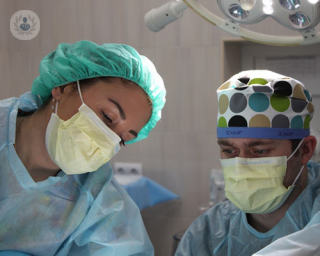

An expert guide to POEM treatment for achalasia
By Mr Amyn Haji
2025-01-06
Achalasia, an unusual conditon where food cannot pass easily from the food pipe to the stomach, often requires surgical treatment. Peroral endoscopic myotomy (POEM) is a minimally-invasive, surgical procedure used to fcailitate the passage of food. We invited highly respcted consultant colorectal and general surgeon Mr Amyn Haji to explain how the procedure is performed and the risks and advantages it offers patients. See more


Achalasia: a possible reason behind swallowing problems
By Professor Muntzer Mughal
2025-01-03
If you're having difficulty in swallowing both drinks and solid foods, then you may be experiencing achalasia, a rare condition that is often overlooked. Read more from our expert surgeon Professor Muntzer Mughal on the causes, symptoms and treatment options. See more
Experts in Achalasia
-
Mr Majid Hashemi
SurgeryExpert in:
- Achalasia
- Gastric sleeve
- Acid reflux
- Hiatal hernia
- Gastric bypass
- Obesity surgery
-
Mr Amyn Haji
Colorectal surgeryExpert in:
- Colorectal cancer
- Polyps
- Endoscopy
- Hernia
- Piles (haemorrhoids)
- Achalasia
-
Dr Rami Sweis
GastroenterologyExpert in:
- Difficult Swallowing (Dysphagia)
- Gastrointestinal endoscopy
- Constipation
- Diarrhoea
- Barrett's oesophagus
- Achalasia
-
Mr Nagammapudur Balaji
SurgeryExpert in:
- Achalasia
- Acid reflux
- Laparoscopic hernia surgery
- Bariatric surgery
- Gallbladder surgery
- Hiatal hernia surgery
-
Professor Nick Maynard
SurgeryExpert in:
- Gastroscopy
- Upper GI surgery
- Hiatal hernia surgery
- Achalasia
- Cholecystectomy
- See all

Cleveland Clinic Moorgate Outpatient Centre
Cleveland Clinic Moorgate Outpatient Centre
55 Moorgate, EC2R 6BH
No existe teléfono en el centro.
By using the telephone number provided by TOP DOCTORS, you automatically agree to let us use your phone number for statistical and commercial purposes. For further information, read our Privacy Policy
Top Doctors

Cleveland Clinic Portland Place Outpatient Centre
Cleveland Clinic Portland Place Outpatient Centre
24 Portland Place, W1B 1LU
No existe teléfono en el centro.
By using the telephone number provided by TOP DOCTORS, you automatically agree to let us use your phone number for statistical and commercial purposes. For further information, read our Privacy Policy
Top Doctors

The Princess Grace Hospital - part of HCA Healthcare
The Princess Grace Hospital - part of HCA Healthcare
The Princess Grace Hospital, 42-52 Nottingham Pl, W1U 5NY
No existe teléfono en el centro.
By using the telephone number provided by TOP DOCTORS, you automatically agree to let us use your phone number for statistical and commercial purposes. For further information, read our Privacy Policy
Top Doctors
-
Cleveland Clinic Moorgate Outpatient Centre
55 Moorgate, EC2R 6BH, Central LondonExpert in:
- Digestive
- Cardiology
- Dermatology
- Diagnostic Imaging
- Diagnostics
- Obstetrics and Gynaecology
-
Cleveland Clinic Portland Place Outpatient Centre
24 Portland Place, W1B 1LU, Central LondonExpert in:
- Diagnosis of Cancer
- Diagnostics
- Women’s health
- Sports Medicine
- General practice
- Health check up
-
The Princess Grace Hospital - part of HCA Healthcare
The Princess Grace Hospital, 42-52 Nottingham Pl, W1U 5NY, Central LondonExpert in:
- Cancer
- General Surgery
- Orthopaedic surgery
- Robotic Surgery
- Intensive care
- Sports Medicine
- See all
- Most viewed diseases, medical tests, and treatments
- HHT (Hereditary Haemorrhagic Telangiectasia)
- Snoring
- Polysomnography (sleep study)
- Alzheimer's disease
- Nystagmus
- Migraine
- Nutrition
- Weight loss injections
- Nipple discharge
- Abdominal pain
